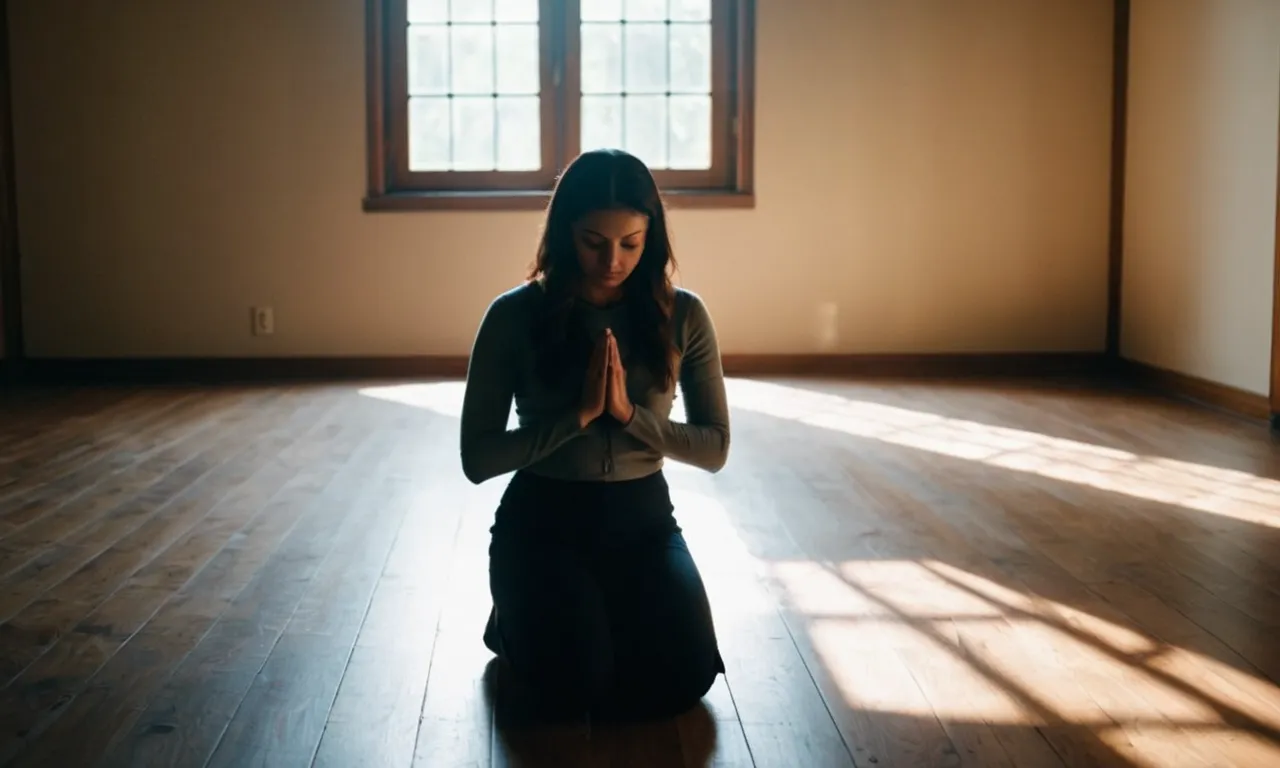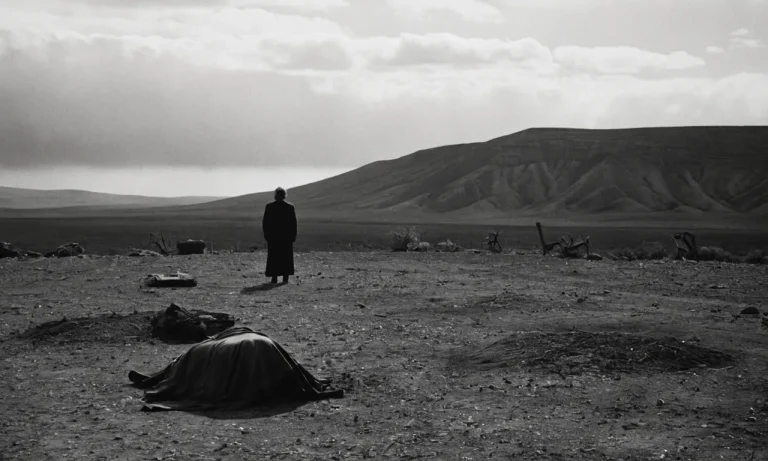What Does The Bible Say About Praying Out Loud?
Prayer is vital for connecting with God. You may have wondered if you should pray silently or out loud. This comprehensive guide dives deep into the Bible to uncover what it says about vocal prayer.
If you’re short on time, here’s a quick answer: The Bible encourages believers to pray out loud at times, especially when worshipping God collectively in church services. However, the Bible also shows people praying silently and privately.
In this roughly 3000 word guide, we will explore examples of out loud prayer in both Old and New Testaments, analyze verses about private prayer, study Jesus’ teachings on vocal prayer, learn tips for praying out loud in groups or church, and answer common questions people have about this topic.
Out Loud Prayer in the Old Testament
The Psalms Overflow with Out Loud Praise and Worship
The book of Psalms contains numerous examples of believers praying out loud to God. King David, the primary author of the Psalms, often poured out his heart audibly as he communed with the Lord. For instance, Psalm 5:1-3 records David praying, “Listen to my words, Lord, consider my lament.
Hear my cry for help, my King and my God, for to you I pray. In the morning, Lord, you hear my voice; in the morning I lay my requests before you and wait expectantly.” Throughout the Psalms, David and other psalmists cry aloud to God in moments of worship, confession, lament, praise, and thanksgiving.
In addition to individual prayers, the Psalms contain many corporate prayers where God’s people prayed aloud together. Psalm 95 exemplifies this: “Come, let us sing for joy to the Lord; let us shout aloud to the Rock of our salvation.
Let us come before him with thanksgiving and extol him with music and song” (verses 1-2). Here, the psalmist calls God’s people to loudly sing His praises as a congregation.
Prayers Voiced Corporately by God’s People
Besides the Psalms, other Old Testament books also record God’s people praying aloud together. When King Solomon dedicated the temple in Jerusalem, he interceded on behalf of the nation as “he said: ‘Lord, the God of Israel, there is no God like you in heaven above or on earth below—you who keep your covenant of love with your servants who continue wholeheartedly in your way'” (1 Kings 8:23).
Then the people worshiped loudly, “praising the Lord and saying, ‘He is good; his love endures forever'” (2 Chronicles 7:3). Corporate vocal prayer characterized key events in Israel’s history.
The prophets often voiced impassioned prayers aloud as they pleaded for God’s mercy on behalf of His people. For example, Daniel prayed, “Lord, listen! Lord, forgive! Lord, hear and act! For your sake, my God, do not delay, because your city and your people bear your Name” (Daniel 9:19).
The prophets boldly cried out as advocates before God.
Crying Out Loud in Desperation and Distress
Many narrative passages in the Old Testament depict God’s people crying out loudly in times of hardship and danger. When Pharaoh’s army trapped the Israelites at the Red Sea, “Moses answered the people, ‘Do not be afraid. Stand firm and you will see the deliverance the Lord will bring you today.
The Egyptians you see today you will never see again. The Lord will fight for you; you need only to be still.’ Then the Lord said to Moses, ‘Why are you crying out to me? Tell the Israelites to move on'” (Exodus 14:13-15). God heard their loud cries and miraculously parted the sea.
Similarly, when the Amalekites attacked Israel, “As long as Moses held up his hands, the Israelites were winning, but whenever he lowered his hands, the Amalekites were winning. When Moses’ hands grew tired, they took a stone and put it under him and he sat on it” (Exodus 17:11-12).
So Aaron and Hur supported his hands as he cried out to the Lord, securing victory for God’s people.
Clearly, vocal prayer characterized the relationship between God and His people throughout the Old Testament. Believers praised God loudly, confessed sins, made requests, interceded for others, and cried out for help.
God heard their out loud prayers, speaking to them and displaying His power in their lives.
Speaking and Singing Prayer in the New Testament
Jesus Prays Out Loud to Set an Example
Jesus himself frequently modeled praying out loud for others to hear. Several examples in the Gospels depict Jesus lifting his voice in prayer, praising God the Father audibly (Matthew 11:25-26; Luke 10:21; John 11:41-43; John 12:28).
By praying aloud, Jesus set an example for his followers to speak their prayers with courage and joy.
In fact, Jesus rebuked people who prayed only in secret to try and look spiritual. Instead he taught, “When you pray, you must not be like the hypocrites… But when you pray, go into your room and shut the door and pray to your Father who is in secret.
And your Father who sees in secret will reward you”
(Matthew 6:5-6). The issue was not public versus private prayer, but praying from genuine faith rather than for show.The Early Church Prayed Together Out Loud
The early Christians gathered for corporate prayer, singing hymns together as part of their times of worship. For example, in Acts 4:23-31 the believers lifted their voices together to God after the apostles Peter and John were released from custody.
The Scriptures record, “When they heard it, they lifted their voices together to God” (v. 24).
The apostle Paul instructed churches to sing psalms, hymns and spiritual songs together as a community: “Be filled with the Spirit, addressing one another in psalms and hymns and spiritual songs, singing and making melody to the Lord with your heart” (Ephesians 5:18-19).
Singing prayer aloud continues to build unity when Christians join their hearts and voices in worship.
Instructions About Praying and Singing Out Loud in Church Services
Paul gave instructions to regulate corporate prayer and singing during church gatherings so that all things would be done properly and in order (1 Corinthians 14:26-40). He directed that if people were going to pray aloud in tongues, there should also be an interpretation given to build up the whole church.
And if there was no interpretation, Paul stated people should keep silent and pray to God inwardly.
However, Paul makes a distinction between praying in tongues, which not everyone understands, and singing praise and thanksgiving in the ordinary language of the gathered believers. He instructs the Corinthians, “In church I would rather speak five understandable words to instruct others than ten thousand words in a tongue.
“ The key is clarity so that the church can worship together in unity and everyone can receive teaching (1 Corinthians 14:19).
Verses Confirming Silent, Private Prayer
The Bible encourages believers to pray in private as well as corporately. Here are some verses that confirm the validity and importance of silent, personal prayer:
Matthew 6:6
“But when you pray, go into your room, close the door and pray to your Father, who is unseen. Then your Father, who sees what is done in secret, will reward you.” This verse from Jesus’ Sermon on the Mount affirms praying alone in a private place where one can focus solely on God.
1 Thessalonians 5:17
“Pray continually.” This exhortation suggests believers cultivate an ongoing dialogue with God throughout the day. Though some prayers may be voiced aloud, much of this continual conversation occurs silently within one’s spirit.
Romans 8:26
“In the same way, the Spirit helps us in our weakness. We do not know what we ought to pray for, but the Spirit himself intercedes for us through wordless groans.” This verse confirms that the Holy Spirit prays silently within us, often expressing the deepest groans of our hearts better than words can articulate.
1 Samuel 1:12-15
When Hannah was praying silently for a child, the priest Eli thought she was drunk because her lips were moving but no sound came out. This shows how normal and commonplace silent prayer was in biblical times.
While vocalized prayer serves an important communal purpose, these verses make clear that silent, inner prayer is just as biblically valid. God hears the sincere petitions of our hearts whether we pray aloud or in the quietness of our spirits.
Through quiet contemplation and listening, we may even discern the gentle whispers of the Holy Spirit within us.
Tips for Praying Out Loud With Others
Overcoming Shyness When Praying Aloud
Many believers feel bashful about praying aloud in front of others, but there are some great tips to help overcome this shyness.
- Start by praying aloud when you’re alone to grow more comfortable with verbalizing your thoughts to God.
- Volunteer to pray in small group settings to practice speaking out loud before working your way up to larger crowds.
- Focus on God when praying aloud, rather than worrying what others may think.
- Ask a close friend or pastor to specifically pray for your confidence in public prayer.
As we spend more time in prayer, our intimacy with God grows, and vocal prayer becomes as natural as speaking with a close friend. So be patient with yourself and remember that “God gave us a spirit not of fear but of power and love” (2 Timothy 1:7).
Leading Out Loud Prayer in Church Meetings and Small Groups
It’s a privilege to lead fellow believers in verbal prayer, but it also comes with great responsibility. Here are some pointers for praying effectively aloud with others:
- Study Scripture related to prayer, like the Lord’s Prayer (Matthew 6:9-13), to understandBiblical principles.
- Listen to the Holy Spirit’s leading when formulating what to pray.
- Keep expressions concise yet meaningful when leading group prayer.
- Pray humbly, avoiding pretentious or overly complex words.
- Remember everyone present by interceding for various needs in the faith community.
According to surveys by Lifeway Research, 87% of Protestant pastors say they pray aloud with their congregation each week. As we develop skills for public intercession guided by Scripture, we can powerfully glorify God together.
Common Questions About Vocal Prayer
Prayer is an integral part of the Christian faith. Many believers wonder about the role and purpose of vocal prayer. Here are some common questions people have about praying out loud:
Should I pray out loud or silently?
The Bible does not specifically command believers to pray out loud or silently. God hears our prayers whether they are spoken or not (Psalm 139:4). However, praying out loud can be beneficial in certain situations.
For example, when praying corporately at church or in a small group, vocal prayer allows others to agree with and join in your petitions. Praying aloud with other believers can foster unity, empathy, and encouragement (Matthew 18:19-20).
When praying in private, vocal prayer may help you focus your thoughts and be more intentional in your communication with God. However, silent prayer can also allow you to be still and listen to God’s leading (Psalm 46:10).
The important thing is to pray from your heart, whether through spoken or unspoken words.
Should I pray out loud in public places?
Praying aloud in public places is generally acceptable, though some wisdom and sensitivity to your surroundings is wise. Praying quietly over a meal in a restaurant or softly uttering a prayer request while waiting in line is usually not disruptive.
However, loudly praying at length in a confined public area where others cannot easily move away could be considered inconsiderate.
When vocalizing prayers in public spaces, aim to be respectful of those around you. As Jesus said, some overt displays of piety can look like showing off to gain admiration from others (Matthew 6:5-6).
Pray from the heart, focusing on your communication with God rather than trying to impress onlookers.
How can I learn to pray out loud comfortably?
For those unaccustomed to vocal prayer, praying aloud can feel intimidating or awkward at first. Here are some tips to help you gain confidence:
- Start by praying aloud when alone. Spend time praying out loud when you are by yourself to become more comfortable verbalizing your thoughts.
- Pray aloud with close friends or family. Practicing vocal prayer with trusted loved ones can help prepare you to pray in front of others.
- Pray short, simple prayers to start. You don’t have to pray eloquent lengthy prayers. A few heartfelt sentences are just fine.
- Focus on God, not your performance. Remember that God cares more about the condition of your heart than the polish of your words.
- Ask God to help you. Ask the Lord to help you overcome anxiety and distractions to pray from your heart.
With practice over time, praying aloud can become more natural. God is gracious and will help you as you seek to communicate with Him through vocal prayer.
Should I pray out loud using King James English?
There is no biblical mandate to use King James English when praying. The important thing is to pray sincerely using natural language. In the Bible, people prayed conversational prayers to God in their own words and style (Exodus 33:12-13).
Jesus taught His disciples to pray simply and candidly, like children speaking to their father (Matthew 6:9-13).
Praying in Elizabethan English can distance people from genuinely communing with God. It also creates unnecessary barriers to prayer for those unfamiliar with it. Pray from the heart in a real, transparent way. God wants to hear your authentic voice.
However, for some, utilizing more formal language can help them focus and be more reverent in prayer. Do what helps you pray most earnestly, whether that involves modern or traditional language. The style of speech is far less important than the condition of your heart.
Conclusion
In closing, the Bible clearly shows believers praying out loud together and individually at times. While private prayer is also encouraged, vocal prayer allows us to openly praise God, set an example for others, and unite our voices in corporate worship.
The next time you pray, consider being more vocal. Lift your voice to magnify God’s glory. Pray through any shyness or uncertainty you feel. Let your loud praise resound and set your heart ablaze with love for your Creator.








